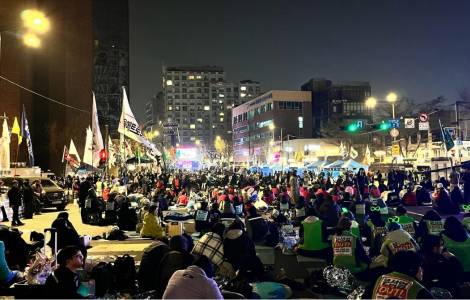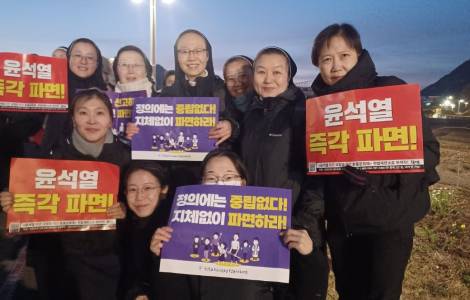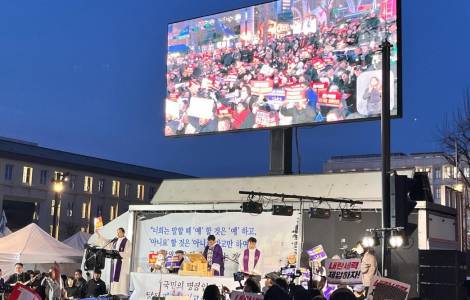
Photo Yiho
by Pascale Rizk
Seoul (Agenzia Fides) - After 111 days since his indictment on December 14, 2024, South Korea's 20th President, Yoon Suk Yeol, was definitively removed from office today, April 4, at 11:22 a.m. (local time) by the Korean Constitutional Court, following a unanimous ruling by all eight judges.
"First and foremost, we call on the State authorities to make every effort to regain the people's trust and establish harmony. In particular, we urge politicians not to forget that they exist to serve the people and to promote a policy of mutual respect and listening, oriented towards coexistence," said the country's Catholic bishops following the Constitutional Court's ruling impeaching President Yoon Suk-yeol. "The process of electing a responsible and moral leader with a view to social reconciliation and the common good must be conducted in a democratic and mature manner," the bishops emphasized. New elections must now be held within the next 60 days.
Impeachment proceedings have been initiated against the South Korean president after he ordered the imposition of martial law on the night of December 3rd to "eradicate pro-North Korean forces and protect the democratic constitutional order." Unlike the impeachment trial of former President Park Geun-hye in 2017, which lasted 11 days, and the trial of former President Roh Moo-hyun in 2004, who was reinstated 14 days after the hearings, the verdict against Yoon came after six weeks, during which many Koreans continued to demonstrate in public squares against or for Yoon. Protests have intensified over the past three weeks in front of the Constitutional Court building in Songhyeon Square, where 2,000 clergy and believers from various faiths, including 200 Catholic priests, gathered on Monday, March 31.
Today, more than 14,000 police officers were deployed in Seoul to prevent violent riots. The security distance from the court building, originally set at 100 meters, was extended to 300 meters, with police buses used as barricades. Yoon's declaration of martial law late last night appeared to many analysts as the latest attempt to maintain control over the country's political decision-making process after his People's Power Party failed to get a bill passed through the opposition Democratic Party-controlled parliament. His actions sparked a response from numerous Koreans, who staged massive protests outside the National Assembly. Despite attempts by elements of the military to prevent parliamentarians from voting to lift martial law, it was lifted just six hours after its declaration, before sunrise on December 4, 2024. The president was arrested on the basis of an arrest warrant issued on New Year's Eve. The arrest took place on January 15 by officers of the Corruption Investigation Office (CIO). Yoon's defense team won the Seoul Central District Court's overturning of the arrest on Friday, March 7, citing several procedural loopholes in the prosecution. "It is said that history repeats itself, but today our nation and our people are forced to painfully write an unfortunate page of history that no one ever wanted to see. For the second time in our history, the impeachment proceedings against a popularly elected president have been upheld," reads the bishops' letter to the Korean faithful. "Now the time for politics begins: We must combine our wisdom to elect a new President who will lead our nation. We must choose a leader who deeply recognizes that presidential power is a power delegated by the people, a power that serves the people, and who has the attitude and willingness to sacrifice himself at any time to protect the lives and property of the people." Over the past six weeks, several appeals for calm have been made to citizens, and politicians have been called upon to work to help South Korea overcome the crisis. "Respect and accept the Constitutional Court's decision so that this national crisis can be resolved smoothly," read the appeal published on March 5 by the Association of Major Religious Denominations in South Korea, including the Catholic Church (represented by Bishop Matthias Ri Long-hoon, Chairman of the Catholic Bishops' Conference of Korea and Bishop of Suwon). In their "Statement to the People Before the Impeachment Trial," the representatives of the religious communities stressed that "democracy is based on respect for rules." One of the final appeals to the Constitutional Court was launched a few days ago by Cardinal Lazaro You Heung-sik, Prefect of the Dicastery for the Clergy. In a message addressed to the faithful in Korea on March 21, the Cardinal called for them to "listen with a heart of despair for the Republic of Korea in crisis" and "to the voice of justice and conscience that dwells deep within us" and to no longer hesitate to "make a judgment of conscience." The Korean Bishops' Conference also issued a statement on April 1, after the Constitutional Court announced that it would hold the impeachment proceedings against President Yoon Seok-yeol on April 4: "We must adopt a stance that welcomes any decision of the Constitutional Court. Regardless of the decision, the Church in Korea will pray in the hope that all citizens will respect and accept the ruling. In this way, our country will take another step toward becoming a more mature democratic nation." In recent months, South Korea has been more polarized than ever. From the very first evening, the bitter cold of December did not stop Koreans from taking to the streets to rebel against the first declaration of martial law since the military regime (1961-1987). There were also defenders of the deposed President Yoon, while the belief that the will of the people is the foundation of democratic political institutions remains undiminished. Now everyone hopes that the verdict will help overcome the period of political turmoil the country is currently experiencing, which has also been hit by natural disasters, including the crash of a Korean airliner on December 29, 2024, which killed a total of 179 people. (Agenzia Fides, 4/4/2025)

Photo Vincent Park

Photo RGS Corea

Photo Vincent Park

Photo Vincent Park